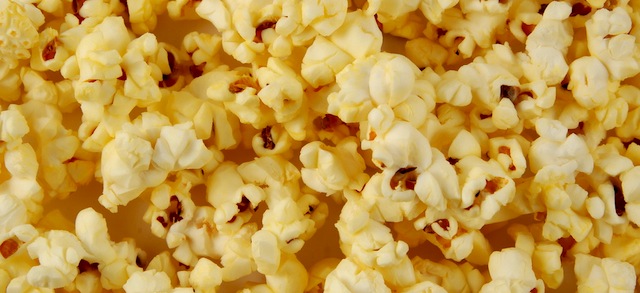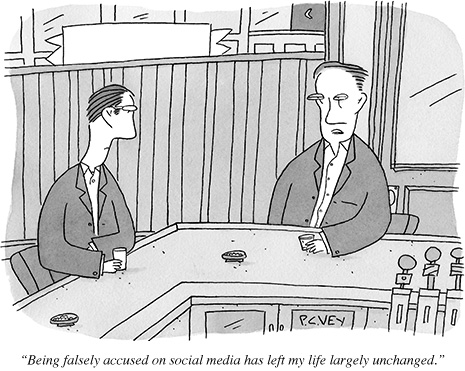
A pretty relevant article appeared in The NY Times the other day on the phenomenon of “hate-reading/-watching”, courtesy of novelist Teddy Wayne. Not much to say on the subject that we haven’t said elsewhere, either when asking why we’re so obsessed with that person from sixth grade or contemplating “87 percent of our mental life.” Suffice it to say, the (short-lived) self-esteem boost we get from gaping in disbelief at the unenlightened online or on cable or in a tabloid is the inverse of the self-recrimination we feel when looking at those who seem to have it all together in those same places. A vicious cycle of insecurity in other words, and more evidence of the bottomless pit of our need to justify ourselves. To paraphrase yesterday’s O’Connor prayer, it all boils down to l-a-w. More commentary at the bottom, ht CB:
Our motives rarely come from a position of strength, as Katie J. M. Baker, a writer for Jezebel, described in her exploration of hate-reading the Internet. “I usually hate-read alone, late at night when I’m procrastinating, drunk, bored or all three,” she wrote. “When I finally walk away from my computer, I feel like I’ve just binged on a butter-sogged bag of popcorn before the movie even started: I’m slightly nauseated, but still can’t help licking my fingers for more fatty flavor.”
Ms. Baker concluded her essay with a vow to go “cold turkey,” as “hate-reading satisfies my negative energy, but it leaves me with little more than a false sense of both security and productivity.” Or, as she said in an interview (after acknowledging she wasn’t able to swear off the habit completely), “The practice became way less satisfying after I realized that I was hate-reading to feel superior to other people.”
Her self-assessment may be a more enlightened version of the findings from Alexander H. Jordan, an adjunct assistant professor of business administration at Dartmouth. In a Stanford study suggesting we underestimate negative emotion in others’ lives (a misjudgment exacerbated by the cheery cast of most social-media personae), he and his co-authors wrote, “Some research suggests that downward emotional comparisons can improve people’s well-being.”
“It’s when a person’s typically rosy self-view is temporarily threatened that self-enhancement processes, such as finding people to ‘hate’ online, are triggered,” Professor Jordan said in an interview. “Research has also shown that people who are chronically unhappy or low in self-esteem are more concerned about social comparisons, upward or downward, in general.”
So, a common way to boost one’s ego through “emotion-regulation strategy,” he said, “is to look down on other people, such as reading a dumb blog to feel smarter or looking at photos to feel more stylish or a drama-filled Facebook page that might make you feel you’re well adjusted.”
It’s not schadenfreude, he noted; it’s more akin to gloating.
Worse, these sad, insecure people (in other words, most of humanity, at one time or another) descend into “unhealthy feedback loops,” he said. “People look around at others’ ‘perfect lives’ on Facebook, feel bad about themselves, boost their self-regard by putting out their own ‘perfect lives’ and/or hate-reading others’ pages, and then their ‘perfect lives’ make others feel bad about their own lives in turn.”
The only obvious addendum here might be that hate-reading/-viewing is by no means limited to an ex-friend’s Facebook profile or the irresistible sanctimony of Bill Maher or Bill O’Reilly (as the case may be). Religious circles are ridiculously susceptible to this kind of gloating as well–and I’m not just talking about New Atheists or the Westboro people who went off on Twitter about our Vince Gill post last week (though that was entertaining–wink wink). I’m talking about something that predates the Internet by a long shot. Oftentimes when we read those with whom we fervently disagree, visit their church websites, or, say, comment on their blogs, it’s not because we’re interested in learning or engaging but because the jolt of self-importance we feel is, if anything, more pleasurable than in “secular” instances. In fact, it may even be compounded by what we think are “righteous” motives. We’re only defending orthodoxy after all. Or exposing the toxicity of legalism. Or advocating for radical inclusiveness. Or, yes, making sure grace remains unsullied by works. Doctrinal policemen of all stripes are equally insufferable. Which doesn’t mean there’s no such thing as right or wrong, good or bad, Gospel or non-, just that our relationship to those things is profoundly and inescapably muddied; this side of paradise, we leverage these objectivities for well-being almost automatically. At least, I know I do. I’m doing so right now.
I suppose this cycle of insecurity–ideological, personal, or otherwise–cannot ultimately be moderated. Not by switching off our computer or changing channels and certainly not by keeping our ponds small enough to look big. Hope, if it is hope at all, cannot lie in finding a more comfortable place on the smugness-to-sadness spectrum, but in the possibility of that line coming to an end. A dead end.
Kind of like the Emmy Awards last night and the morons who gave the nod to Jeff Daniels over Bryan Cranston. Bada-bing!

COMMENTS
2 responses to “Binging on Bags of Popcorn, or Misadventures in Hate-Viewing (and Reading)”
Leave a Reply














Why yes, I did indeed stop reading mid-article and fly to twitter, hoping to pull out my own popcorn bucket and see the fireworks from Westboro folks 🙂 Guilty as charged!
Thank you for this one. I had just “hate read” something before I read this.